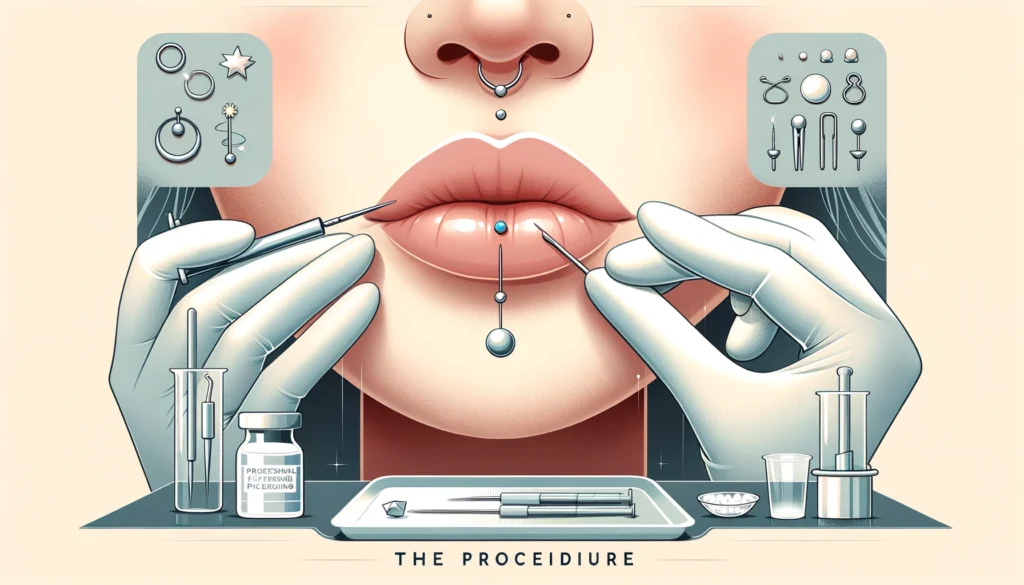Snake bites piercings, characterized by two piercings symmetrically placed on either side of the lower lip, have become a popular form of body art. However, while they offer a unique way to express individuality, they also pose potential risks to oral health, particularly to teeth.
Introduction to Snake Bites Piercings
Understanding Snake Bites Piercings
Snake bites piercings are a type of lip piercing that mimics the look of a snake bite, with two punctures made on the lower lip. They can significantly alter one’s appearance and, like all forms of body modification, come with risks and responsibilities.
The Procedure
Performed by professional piercers in clean, sterile environments, the procedure involves puncturing the lower lip twice with a needle, followed by the insertion of jewelry, typically studs or rings.

Potential Risks to Dental Health
Direct Tooth Damage
The constant contact between the jewelry and the teeth can lead to chipping, cracking, or even fracturing of the teeth. This is especially true for the lower front teeth that are in close proximity to the piercings.
Enamel Erosion
The repetitive rubbing of metal against the teeth can wear down the protective enamel layer, leading to increased tooth sensitivity and susceptibility to cavities and decay.
Gum Damage
The friction and pressure from the jewelry can also irritate and wear down the gum tissue, leading to gum recession. This exposes the roots of the teeth, increasing the risk of decay and sensitivity.
Periodontal Complications
Persistent irritation from the piercings can lead to periodontal disease, characterized by swollen, bleeding gums, and, in severe cases, tooth loss.
Oral Hygiene and Care Challenges
Increased Infection Risk
The mouth is a breeding ground for bacteria, and any piercing can introduce pathogens, leading to infections. Proper aftercare is essential to prevent complications such as oral abscesses.
Cleaning Difficulties

Maintaining optimal oral hygiene can be more challenging with snake bites piercings. The jewelry can obstruct the cleaning process, making it difficult to remove all food particles and plaque.
Preventive Measures and Solutions
Regular Dental Checkups
Routine dental visits are essential for those with snake bites piercings. Dentists can monitor oral health, identify any signs of damage or disease early, and provide advice on proper care.
Choosing Appropriate Jewelry
Opting for the correct size and material can minimize risks. Non-reactive materials like surgical steel, titanium, or bioplast are less likely to cause irritation or allergic reactions.
Meticulous Oral Hygiene Practices
Adopting a rigorous oral hygiene routine is crucial. This includes regular brushing, flossing, and using an antiseptic mouthwash to reduce the risk of infection and promote healing.
Conclusion
While snake bites piercings can be an attractive form of expression, they come with potential risks to dental health. Awareness and understanding of these risks, along with diligent care and regular dental checkups, are vital for those choosing to adorn their lips in this fashion.
By taking the necessary precautions and maintaining strict oral hygiene, individuals can enjoy their piercings while minimizing the impact on their dental health.
Frequently asked Questions
What are snake bites piercings?
Snake bites piercings consist of two symmetrical piercings located on either side of the lower lip. They resemble the look of a snake bite, hence the name.
Can snake bites piercings damage my teeth?
Yes, snake bites piercings can potentially damage your teeth. Constant contact with the jewelry can lead to tooth chipping, cracking, or enamel erosion.
Are snake bites piercings risky for my gum health?
Yes, there is a risk of gum damage due to the pressure and friction from the jewelry, which can lead to gum recession and expose the roots of your teeth to potential decay and sensitivity.
How can I prevent damage to my teeth and gums from snake bites piercings?
Choose appropriate, non-abrasive jewelry, maintain excellent oral hygiene, and schedule regular dental checkups to monitor your oral health.
What kind of jewelry is safest for snake bites piercings?
Jewelry made from biocompatible materials like surgical steel, titanium, or bioplast is generally considered safe and less likely to cause irritation or allergic reactions.
How do I clean my snake bites piercings?
Clean the piercing site with saline solution or an antiseptic mouthwash, avoid playing with the jewelry, and ensure thorough oral hygiene to prevent infection and promote healing.
What should I do if my piercing is causing tooth or gum problems?
Consult with your dentist or piercer immediately. You may need to change the jewelry or remove it temporarily or permanently to prevent further damage.
Can snake bites piercings lead to infections?
Yes, like any other piercing, snake bites piercings can lead to infections if not properly cared for. Symptoms include redness, swelling, pain, and discharge.
Will i need to remove my snake bites piercings for dental checkups or procedures?
It is often recommended to remove oral jewelry during dental checkups and procedures to allow better access and to prevent any damage or interference.
Can I replace my snake bites piercing jewelry with something less harmful to my teeth and gums?
Yes, you can replace your piercing jewelry with shorter, smoother, or softer options that reduce the risk of dental and gum damage. Your piercer can advise on the best alternatives.
